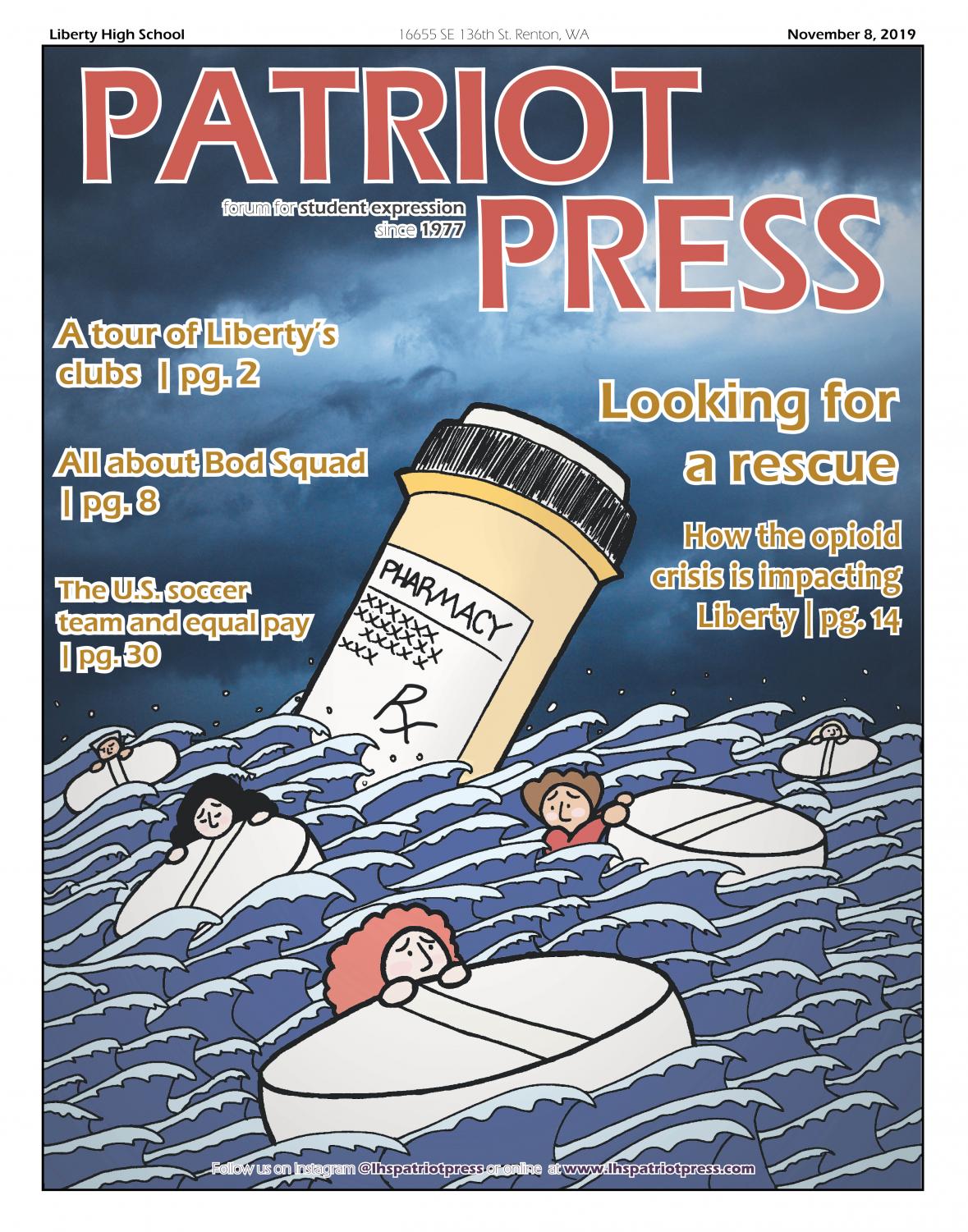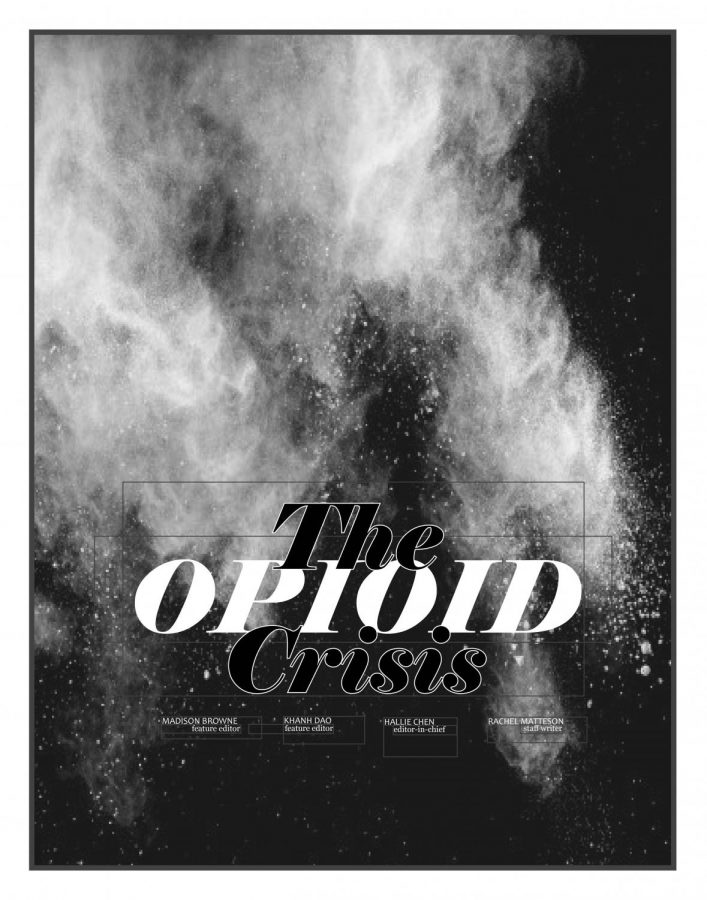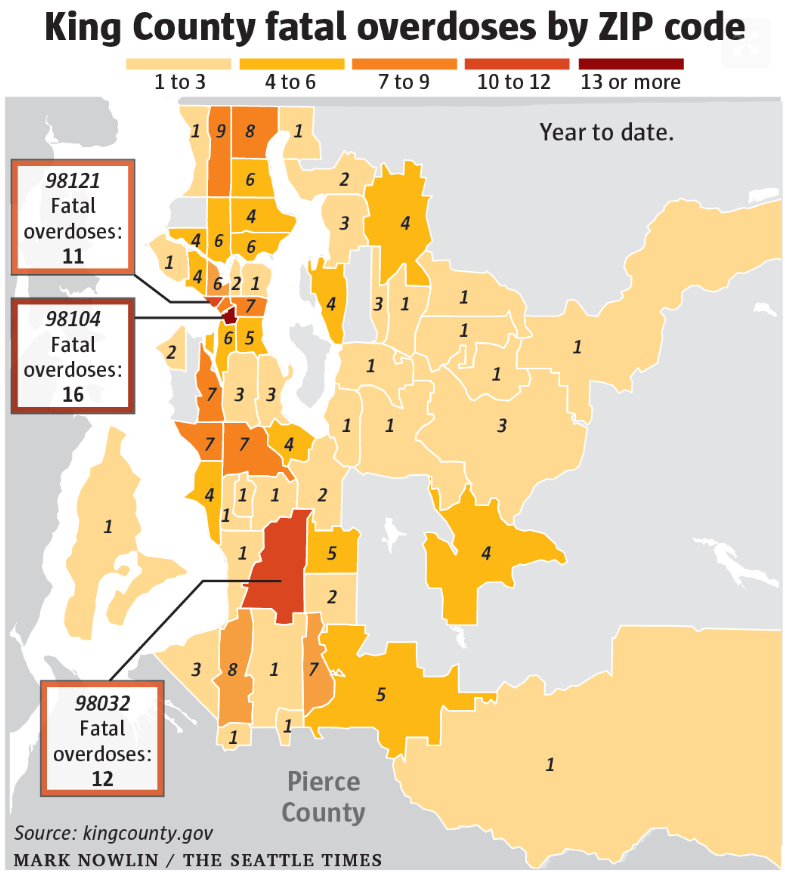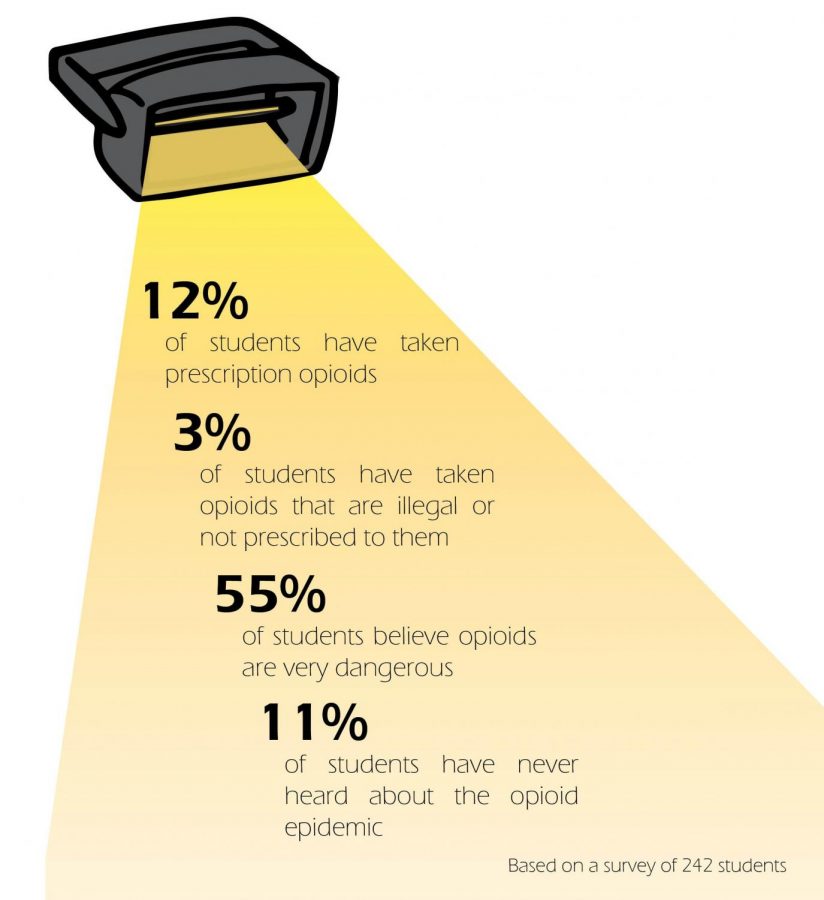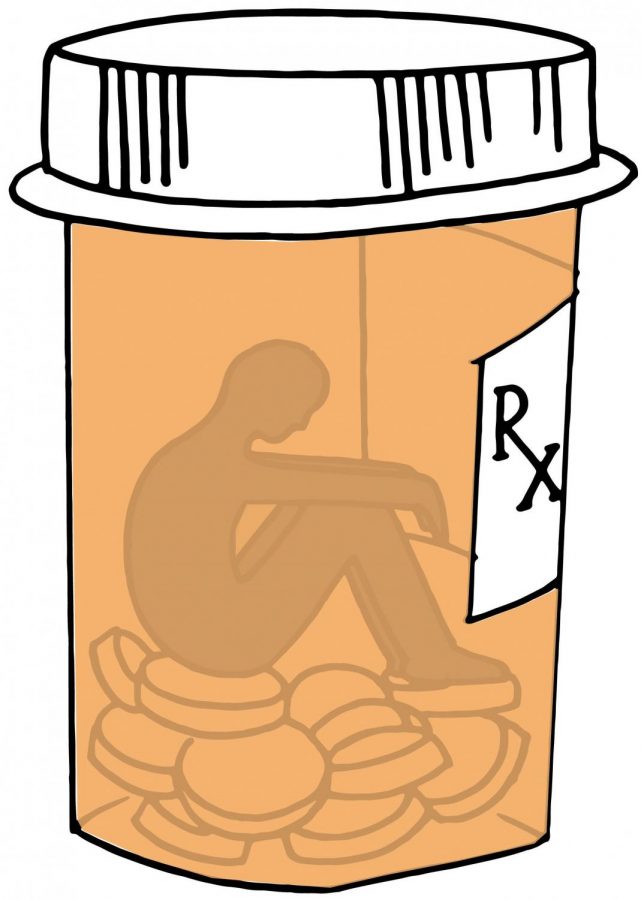The Opioid Crisis
November 8, 2019
The brutal truth about opioids
Since 1999, opioid abuse has been rapidly racking up its death toll of more than 400,000 deaths nationwide and 742 deaths in Washington State prior to 2017. As this drug becomes more common in our community, it’s important that Liberty students are educated.
“If there’s a situation involving opioids or other drugs now or in college or in your adult life, you should have the right tools to make an informed decision,” Principal Sean Martin said.
Opioids come in many different forms, whether it be as a powder or pale pills. There’s also homemade pills, or the street drug opioid. These street opioids can bring more dangers to one’s health.
“What we’re finding now is that a lot of the homemade pills tell you they’re made from one thing, but there’s no way to ensure that there are the right amounts to be safe for someone who’s taking them,” Officer Hale said. “In measuring an amount for a batch, some of the pills come out with different strengths and intensities of drugs in each individual pill.”
Students also need to know the effects these drugs can bring.
“Opioids occupy the receptor sites for our happy hormone, inhibiting our pleasure response. Those are really strong natural responses within our body,” AP Psychology teacher Laura Henry said. “It’s been associated with the feeling we get when we eat food and have sex—basically, biological life functions.”
Withdrawal symptoms of opioids are very dangerous, including depression, anxiety, and tremors are just a few examples of possible symptoms. It’s best to avoid these at all costs.
“Teens think, ‘it’s fine, it won’t bother me,’ but it does. It’ll happen. Addiction doesn’t discriminate,” said Laura Henry.
A growing problem in the community
One deadly drug, rare enough to fly under the radar. Victims of addiction, names unknown to us, identities irrelevant. Statistics in the news, seen only as numbers on a page. At Liberty, opioids were a distant threat, recognized but not understood.
A distant threat until August, when a Skyline student overdosed on narcotics, sending ripples of grief through the community.
“Opioids become a means of popularity, like if you use it, you’re included in that group,” freshman Tabitha Peacock said. “It makes me sad that kids think they have to start using drugs to fit in.”
The abuse of drugs and alcohol because of social pressure is a notorious problem for teenagers. Even so, the abrupt increase in fatalities from drug overdose, particularly those of opioid-related causes, came as a shock to Principal Sean Martin.
“The opioid crisis and pill abuse has crossed over some of the traditionally rigid geographic boundaries,” Martin said. “Nine years ago, judging by the geography of each of the high schools, you could pinpoint what they struggled with within their community. Now, this is something that we’re seeing is sadly and tragically universal.”
Three students from Skyline and Ballard high schools have passed in recent months after taking opioids laced with fentanyl, a highly concentrated synthetic opioid used as an extreme painkiller. However, street drugs such as those taken by the Skyline students, often contain varying amounts of the potent drug, making accidental overdose far easier and far more common.
“What we’re finding now is that a lot of the homemade pills tell you they’re made from one thing, but there’s no way to ensure that there are safe amounts,” Safety Resource Officer Cindy Hale said. “In measuring an amount for a batch, some of the pills come out with different strengths and intensities of drugs in each individual pill. There’s no way to control it.”
There are more risks associated with opioids than just overdose. Addiction forms quickly after one exposure to the drug, especially when the amounts of substance in each pill is uncontrollable.
“It doesn’t take much to get addicted—it only takes once or twice,” AP Psychology teacher Laura Henry said. “There are people that are more susceptible to addiction than others. Life situations have a big impact; if you’re going through a hard time, you’ll do more to escape.”
Becoming dependent on opioids and the escape they provide can be detrimental to more than just the addicted individual; the community around them suffers as well.
“People will do almost anything to try and get that feeling and calm your brain’s demand for the drug. That means theft, that means lying, that means breaking the law. We all know how that can have negative impacts on a community,” Henry said.
Skyline’s community has suffered significantly from opioids, losing two sixteen-year-old students in less than a month. Although Liberty hasn’t seen the same drastic problem, the issue remains relevant.
Struggling for sobriety
“Addiction is a family killer, in a sense. With addiction, there are lies, and lies tear families apart.”
Senior Martha Andrews* knows this firsthand. Her dad has struggled with addiction her whole life, slipping in and out of sobriety, changing the dynamic of her family forever.
The hardest part for Andrews, however, is knowing that a few bad choices in high school kickstarted her dad’s addiction and ongoing battle.
“My dad went to a few parties in high school, but he never thought anything of it,” Andrews said. “It was a slow progression from alcohol—your classic red Solo cup—to marijuana, and then other painkillers and opioids.”
After going to rehabilitation for opioid addiction, he remained sober for a long stretch of time. However, after he was prescribed pain medication, everything went downhill.
“He got hooked to the pain pills and lost his sobriety,” Andrews said. “He stayed away from alcohol, and he’s sober now, but for a while, there was a struggle.”
Watching her father’s addiction come in waves, Andrews felt firsthand the repercussions of living with addiction.
“It took a toll on my dad because he lost a lot of loved ones,” Andrews said. “It made a severe impact on my family.”
Opioid addiction, for Andrews, is not just about the addicted individual. The family, friends, and community around her dad, including herself, changed irrevocably. Her parent’as rocky relationship caused her to change her views of the people around her.
“My dad’s addiction has shaped who I surround myself with,” Andrews said.
She’s gotten better at picking up on the signs of addiction, hoping to prevent her friends from following in her dad’s footsteps.
“It’s things like drinking alone, or feeling the need to be in a situation like a party where there’s alcohol and drugs,” Andrews said. “Or surrounding themselves with a group of friends, but always with other substances.”
She believes most students still don’t know enough.
“In high school there’s a lot of parties,” Andrews said, “but people don’t realize that what they’re taking could lead to something so much more destructive.”
Fentanyl: The New Opioid Predator
Fentanyl is a synthetic opioid prescribed to treat severe pain.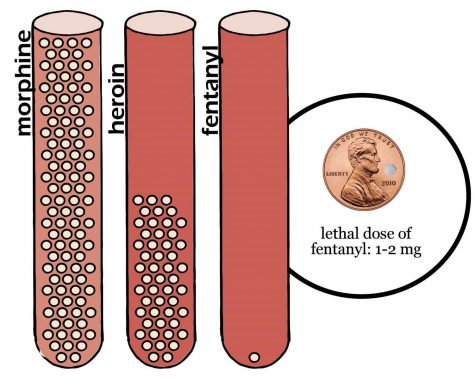
50X more potent than HEROIN
100X more potent than MORPHINE
Illicitly Manufactured Fentanyl:
- often mixed with heroin or cocaine or pressed into counterfeit pills, at times without the user’
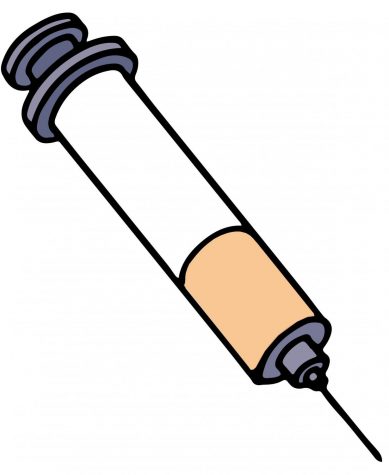 s
s - knowledge
- also known as Apache, China Girl, China White, Dance Fever, Friend, Goodfella, Jackpot, Murder 8, TNT, and Tango and Cash
- leading cause of the recent rise in synthetic opioid deaths
Synthetic Opioid Deaths
in the United States in the past five years increased by 10-fold
Are pain killers worth the price?
Last year, 10.3 million people in the United States overused prescription opioids, a common gateway to opioid addiction. These millions of victims seem like just numbers in a news article, but for senior Jake Sokoloski, this statistic became personal.
“The summer before my junior year, I broke my nose, so they had to set it back. The whole left side of my face was in pain,” Sokoloski said. “All the nerves connect in your face, so everything hurt. They prescribed me opioids to help.”
Despite being in extraordinary pain, opioids weren’t a good option for him.
“I was prescribed four pills every four hours, but my dad gave me two pills only once,” Sokoloski said. “In the moment, I was relieved to use two, but overall, I’m glad I didn’t continue. I never used them again. I stuck with Advil.”
But if the pills helped the pain, why didn’t he continue using them?
“Ultimately, it was my dad who prevented me from taking more,” Sokoloski said. “My painkillers worked. For a couple hours I didn’t feel any pain. But opiates are also super dangerous to use, and it’s much safer if you just decide not to use it even if it’s prescribed.”
However, avoidance of opioids is easier said than done. Pharmaceutical companies in the United States make huge profits off of prescription opioids each year by keeping the drugs in circulation in hospitals, drugstores, and over-the-counter prescriptions. These narcotics are most commonly given to patients with chronic or temporary pain from injuries or surgeries, including wisdom tooth extraction, a relatively common procedure among high school students. Although not as common as getting four wisdom teeth pulled, Sokoloski’s surgery demonstrates the common problem with prescription drugs and addiction.
“I know some people use street drugs, but it was given to me in pill form by a doctor,” Sokoloski said. “Doctors have to be more careful with who they’re prescribing opioids to. I think if I had gone through the whole bottle, I might have had a problem. It’s strong stuff.”
Sokoloski’s experience taught him the value of questioning what he consumes, but some patients really do require strong pain medication after an extreme injury or surgery.
“Because opioids are so effective, there’s no real way around it,” Sokoloski said. “I would have used them. My dad protected me from myself, and I have to thank him for that.”
If you suspect an overdose:
- Call 911 immediately.
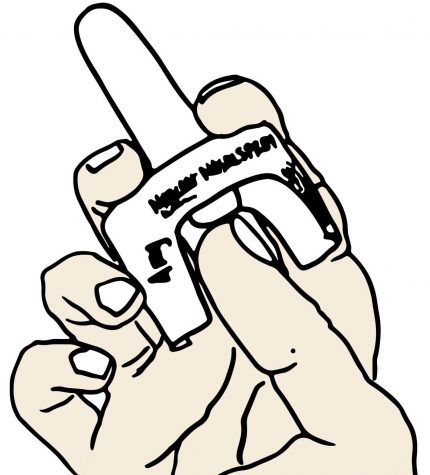
- Administer naloxone.
- Try to keep the person awake and breathing.
- Lay the person to his or her side to prevent choking.
- Stay with him or her until emergency workers arrive.
RESOURCES:
- Stopoverdose.org – helping individuals and communities in Washington respond to prevent opioid overdose
- kingcountysecuremedicinereturn.org – dispose of medicine safely
- kingcounty.gov – report to King County sheriffs anonymously online
